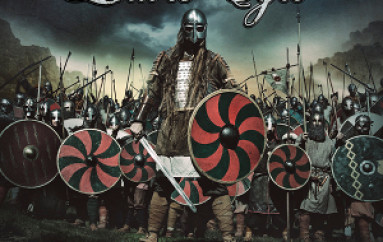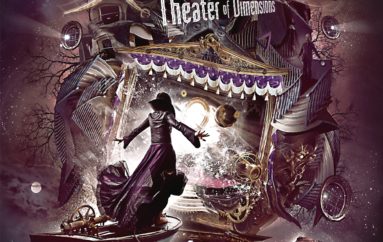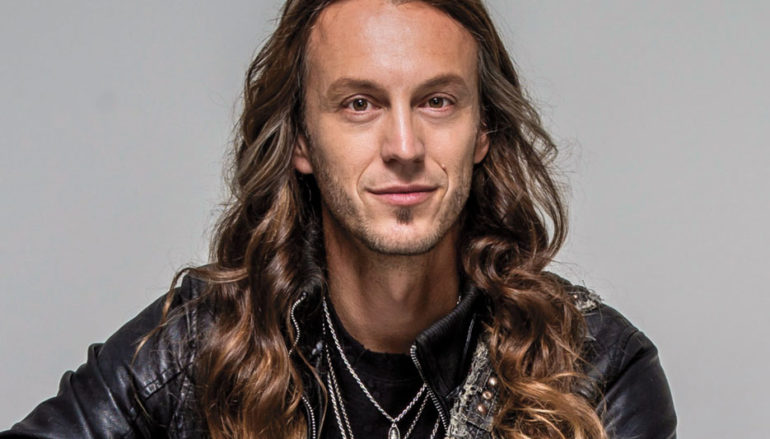
Mark Jansen (Epica): Point of Unification
For the fans of symphonic metal the Dutch sextet Epica hardly needs introduction. The band, founded by guitarist/vocalist Mark Jansen after leaving After Forever, has long overtaken its predecessors in popularity and, in fact, has become the mix of all the best that symphonic metal has to offer.
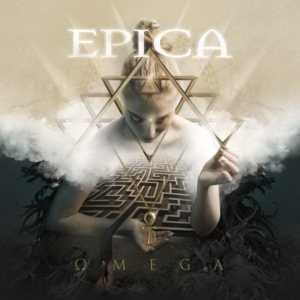 Epica’s music combines various styles – symphonic metal, extreme metal, progressive metal, nods to the classical heritage and neo-folk. Concept-wise each album is dedicated to certain question or idea, be it discoveries in quantum physics, ecumenism, allusions to Zen Buddhism or the hypothesis of the Holographic principle. Epica founder and mastermind Mark Jansen loves topics like this.
Epica’s music combines various styles – symphonic metal, extreme metal, progressive metal, nods to the classical heritage and neo-folk. Concept-wise each album is dedicated to certain question or idea, be it discoveries in quantum physics, ecumenism, allusions to Zen Buddhism or the hypothesis of the Holographic principle. Epica founder and mastermind Mark Jansen loves topics like this.
From the debut of «Phantom Agony» (2003) to «The Holographic Principle» (2016), Epica releases discs with great pace – one every two to three years. The new pause turned out to be a little longer, but the group did not waste the five years of the hiatus. The EP «The Solace System» (2017) and «Epica vs. Attack on Titan Songs» (2018) were released. Also in October 2019 the band reseased the Anniversary remastered version of «Design Your Universe» (2009), and a year later, the compilation «The Quantum Enigma B-Sides» (2020) with bonus and acoustic tracks from various editions of «The Quantum Enigma» (2014). And finally, on February 26, 2021, Epica’s new studio release «Omega» has seen the light. How it was created and what is it dedicated to? Answers, via Skype, Mark Jansen himself.
Hello, Mark! I am glad that I have the opportunity to chat with you a little bit. So, dreams come true! I have been following the work of Epica since about 2013 – since that date, and with the release of each new album I am more and more delighted with your work, observing the evolution in the band’s sound! So, as we know from many sources and interviews, «Epica is a place in the Universe where you can find answers to all pressing questions». Taking this opportunity, I just want to ask you a few questions – you – as an architect of this Universe, consisting of sounds and meanings. We really only have half an hour to talk, but I will try to ask you about the most important things.
Yes.
The first question, in hot pursuit – about the upcoming joint tour with Apocalyptica with the support of Wheel – the progressive metal band. The tour was postponed to early 2022 for obvious reasons related to the pandemic. What special features can we expect from this tour? And will you visit Russia next year, have you received any counter offers from Russian concert agencies?
Yes, yes. So to start with, that we were already in touch with some guys. We wanted to bring Epica to Russia. But obviously, yeah, we have to see how the situation will develop. And when things get better, we will be able to come to Russia again. And the tour with Apocalyptica is postponed till early 2022. And also this… I hope then we can do the shows. But you never know how long this COVID situation is going to last, hopefully not too long anymore. Because for us musicians, it’s very difficult to… not be able to tour. It’s our work, so to say. So it’s a very difficult situation at the moment. But I’m happy that Epica at least – we are surviving! So nobody has to worry about us – we are not in problems. So we can keep on going for a while. And then we can pick up the shows again. So there are other bands who are more struggling at the moment and needing to find other jobs to be able to survive. So I’m more worried about my colleague bands and about ourselves.
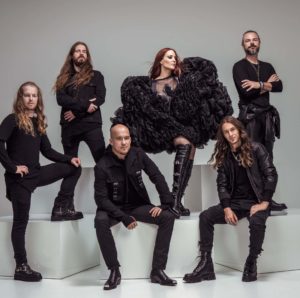 Since I mentioned the progressive metal band Wheel, Mark, such a question… I’ve always been interested in this consideration – is it possible to trace the influence of progressive metal in Epica’s works or not? I mean first of all bands like Opeth, Dream Theater, Haken… In some interviews, by the way, Epica members confess their love for Opeth, which is gratifying! What do you think about this?
Since I mentioned the progressive metal band Wheel, Mark, such a question… I’ve always been interested in this consideration – is it possible to trace the influence of progressive metal in Epica’s works or not? I mean first of all bands like Opeth, Dream Theater, Haken… In some interviews, by the way, Epica members confess their love for Opeth, which is gratifying! What do you think about this?
Yes, definitely Opeth has influenced us. Me personally, I’m a big Opeth fan. I love their music.
Me too!
Good! And I love especially the progressive influences. I love the clean voice of Michael, but also his grunts. And I feel a bit of pity he stopped the grunts on the last albums. But still I like them. But I love especially this balance between his clean voice and the grunts. So I’m happy that live they still do some grunts as well in the older songs. And yeah, Dream Theater also has been an influence of us. Because the progressive side in Epica has always been there, even though not as big as in a band like Opeth or Dream Theater, but it is there, in some songs a bit more, some songs a bit less. But progressive music has always been a part of our lives. Yes.
Mark, about the Omega. Why was the title «Omega» chosen for the new album? As we know, this is the last letter in the Greek alphabet. Some of your fans – they tensed a little: «Won’t the last chapter turn over in the band’s work?..» Or maybe is it a reference to «Alpha and Omega» as symbols of the beginning and end of all things according to the Apocalypse?
Yeah, that’s funny that you mention Apocalypse. Because many people think Apocalypse means the end or a big disaster. But apocalypse is not like a big disaster. But it’s like lifting the veil. So it means like if you have a Revelation, and you see beyond the illusion, that also an Apocalypse. And so this is the song «Omega», we’re singing also about the Apocalypse, but they’re not about the disaster, but about the piercing through the illusion. And «Omega» itself is referring to the Omega Point Theory. It’s a theory from a French priest (Pierre Teilhard de Chardin, – ed.), and where he says that we are fated to swirl towards one point of divine unification. And for me, that was very appealing. Because if we started like with a Big Bang, and in the end, it goes back to one point of unification… It’s like a circle. And I personally believe that it’s possible that there are many universes existing, and that we are just living in one of the millions of universes. And…
 It’s String Theory, maybe…
It’s String Theory, maybe…
Yes, the String theory, if you zoom in, and then you find all kinds of strings of energy, that many dimensions… So but even with the String theory, I think it’s not the final theory. In the future it will be a new theory that goes even further. Because I think everytime science develops and digs deeper and deeper and deeper, and on «The Holographic Principle» we were already discussing the idea that we may be living in a big hologram.
Or in screens.
Yes, everything is possible, everything is possible… So it was some years ago, some 20 years ago, it felt like kind of a weird theory, but nowadays more and more scientists really start taking it serious that we might be living in a hologram. And it’s, for me, it’s not a scary thought, it explains things that we couldn’t explain before. So I love to dive into these kind of topics and write about them. And when fans are fascinated by them, they can start their own journey to learn more about it.
Maybe, yes, the world is developing by the changing of paradigms.
Yes, changes apparently.
Mark, continuing the theme of new album… Why is Ankh (or in other words, the Key of Life) depicted on the cover of the upcoming «Omega» album? Can it be interpreted as a path to self-knowledge in the labyrinths of being, or is it just an obvious reference to the symbol of Ancient Egypt?
Both. I’m personally fascinated by the Egypt traditions and the old Egypt wisdom. And I’ve always loving these wall paintings with all these figures with the Ankh in the hands. They want to do the transition after death, and Ankh makes a bridge for them. But also there is the labyrinth on the cover, and it’s all about self knowledge. Some people in the lives… they don’t explore, they stay in one corner of the labyrinth. But all people want to explore all the corners of their mind and find out what we truly are. And I’m one of these people. So I am going through this labyrinth and explore and trying to find every corner and reaching the middle part, which is eventually inside ourselves. A lot of truth can be found inside of ourselves. And that’s the idea behind having the labyrinth – that we are born in this labyrinth, and it’s up to us to find our way in this labyrinth. Or if we don’t want to find a way just take it as it is and staying in one corner of the labyrinth – that’s fine too. But everybody has a choice either to explore or don’t.
Either to break the wall of labyrinth. To exit.
You can even break the wall – you can do whatever you want.
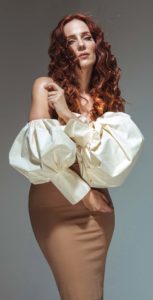 And as we know, Epica already dealt with the ancient cultures, like the Mayan culture on the album «Consign to Oblivion».
And as we know, Epica already dealt with the ancient cultures, like the Mayan culture on the album «Consign to Oblivion».
Yes.
Do you plan to work with some other ancient epics? For example, to the Karelian-Finnish epic «Kalevala», which is based on runes. Or maybe the ancient Japanese ceremonial gagaku music…
Everything is possible, but at this point we don’t know yet what we’re going to write about in the next album. It’s always whatever Simone and me are fascinated by the year before we started recording an album. That is usually the themes that ended up on the album. But at this point, I don’t know yet what in three years I will be studying. But for sure, you can expect some more ancient civilizations showing up in our song lyrics. That’s for sure.
And a question regarding one of the band’s most recent singles, «Abyss of Time – Countdown to Singularity». What do you think is meant by the concept of «singularity» in the context of this composition? After all, the term «singularity» has several meanings depending on the angle – philosophical, mathematical, maybe even astrophysical. What can you say about it?
Yeah, that the most general thought about singularity is the moment in time when artificial intelligence becomes the dominant force, and the computers become smarter than people and overtake us. And the question is when that is going to happen. So I always love to discuss these kind of topics about what’s going to happen. And if what the consequences are when it’s happening. So it’s a very interesting concept. Because some people are afraid of that moment, and they say it will be the end of humanity, other people will say it’s the beginning of something new and can help us in order to become super human beings as well, because I know that Elon Musk is working on some brain implants and then – to half robot half human being.
And go to Mars, yes?
Yeah, everything is possible. We can maybe even become some kind of gods ourselves that create new universes. And you can make your mind go wild about it.
Or biorobotics, maybe.
Yeah.
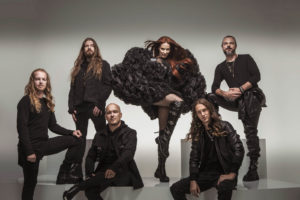 Next question is about cycles and multi-level compositions that are highly significant in the works of Epica, such as «Kingdom of Heaven», and the newest album is also a part of a cycle, an ending of the «metaphysical trilogy», started with «The Quantum Enigma» (2014) and «The Holographic Principle» (2016). How can you characterize this «album triad«, can we call it «super-programme» or macrocycle?
Next question is about cycles and multi-level compositions that are highly significant in the works of Epica, such as «Kingdom of Heaven», and the newest album is also a part of a cycle, an ending of the «metaphysical trilogy», started with «The Quantum Enigma» (2014) and «The Holographic Principle» (2016). How can you characterize this «album triad«, can we call it «super-programme» or macrocycle?
I think that everything in the Universe happens in circles and spirals. And you see that planets circles at their orbits, seasons come and go, the sun comes up and down. The Life and Death is like one big circle. But I see it not definitely as just a circle, but as spirals. Because when a circle is fulfilled, you usually go up one ring in the spiral, in order to not having to simply repeat what you already have done. That wouldn’t make much sense. So I think the purpose and meaning of the life is to fulfill the circle and jump to the next level or dimension of the spiral. And this is a never ending movement that will go on forever. And that’s also why I think that the essence of what we truly are is a thing that exists forever. Our body is what ends, is just a tool for us to live in this weird, wicked universe. Just like hands are useful to pick up stuff here. And body is useful to go around here. But the essence of what we truly are is not our body. It’s something underlying. And many Tibetan Bon monks dedicated the whole life in order to achieve that underlying layer. But it’s not needed to spend the whole life of meditation to realize that we are more than our bodies. And that’s also the topic of these albums, and especially «Kingdom of Heaven» – when science and spirituality come together and combine forces, they will find the deeper truth and meanings of life.
The truth is in synthesis.
Yes, yes.
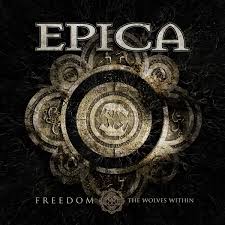 And I find another meaning about the triad of these albums… It seems to me that in general this album triptych is a kind of attempt to revive a long-playing narrative despite the general clip thinking of a contemporary human being. Perhaps these prolonged compositions could be compared with an endlessly sprouting musical form, like a tree?
And I find another meaning about the triad of these albums… It seems to me that in general this album triptych is a kind of attempt to revive a long-playing narrative despite the general clip thinking of a contemporary human being. Perhaps these prolonged compositions could be compared with an endlessly sprouting musical form, like a tree?
Yeah, I love the tree – the tree of life. I even wear an old tree of life. I don’t know if you can see it (shows an amulet that represents the Tree of Life).
Yes, I see.
Because for me, the tree of life is like everything what we are. They say that for the branch to reach out to the sky you need to have roots going deep in the earth. That’s also what’s the Holy Trinity is referring to. We are connected to the Earth and to the Universe, the sky, and we are in the middle. It’s the same like the father, the mother and the child. And that’s the tree of life. The tree of life is a combination of so many fascinating concepts. I can talk about that for hours.
And I think the key question, maybe. Wikipedia states that «Epica’s trademark is female vocals combined with male growling and screaming typically found in gothic metal, the so-called “Beauty and the Beast” duo». Do you think it’s possible to see growling and screaming as Dionysian beginning, and pure female vocals without extreme techniques – as Apollonian? If we recall the well-known philosophical concept of Friedrich Nietzsche…
(Laughs…)
Did you think in such a way from the beginning of the band? If this is so, then can the sound of the choir be interpreted as a kind of balancing force that is on the verge of Dionysian and Apollonian? Or is it just the roots that stretch from gothic metal, as Wikipedia says about it?
Yeah, it’s not something that you have to think too deep about. It’s just happened to be when we were back in the days of my first band After Forever. We didn’t know yet what music style we wanted to do. But we were putting advertisements for a singer, looking for a clean vocalist. But actually, somebody arrived who did growls. And we didn’t want the growls in the beginning. But it happened to be, he joined the band. And that also Floor Jansen joined the band. And then we had suddenly two vocalists. And when the growler guy left the band, we still wanted to keep the songs with grunts. It was not a conscious decision to have a kind of “Beauty and the Beast” effect. It just happened. And when I started later on with Epica, I liked so much this musical style that we developed with After Forever. I simply continued doing that and kept also singing with grunts myself. So it’s, like I said, it’s nothing to think about too deeply. It’s just something that happened to be.
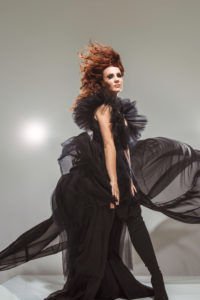 And I want to ask about the timbres of the performance: the use of ethnic musical instruments, the full symphonic orchestra (which very few bands can afford, especially in times of crisis), the expansion of the timber palette from album to album… How can you characterize this forward movement in the context of the band’s genre and style development? And what lies ahead at Epica’s creative horizon in this aspect?
And I want to ask about the timbres of the performance: the use of ethnic musical instruments, the full symphonic orchestra (which very few bands can afford, especially in times of crisis), the expansion of the timber palette from album to album… How can you characterize this forward movement in the context of the band’s genre and style development? And what lies ahead at Epica’s creative horizon in this aspect?
The horizons? I think, at «The Holographic Principle» (2016) we were like reaching a wall. We always wanted to do bigger, bigger, bigger, and every time we had more possibilities. But at a certain point you reach the wall, and you think like: «Now we did everything we wanted to and we sound as bombastic as it can be». But with «Omega» the goal was to go one step back again. Because if you have all the time the guitars and the orchestra going full force, then you lose a bit of the depth, because it’s all the time full force on and it’s very heavy for the ears. So with «Omega» we decided to have more like choices, sometimes with the guitars in front, sometimes with the orchestra. And the other difference is that on «The Holographic Principle» we recorded the orchestra in sections. So, there was a violin section day, a brass section day, woodwinds day… And now in Prague we recorded the Prague Philharmonic Orchestra and they played all together in one room. And I think this way it sounds the best. It’s so natural and pure! So for example, if you use samples (nowadays you have very good samples), you have a good sound. When you record in sections, you have a worse sound. But when you record with a whole orchestra playing at once, it’s the best sound. That was what we learned on «Omega» and I’m happy that we were able to do it this way and had the budget to do so. Because «Omega» sounds exactly like we were hoping for.
I see that you include the children’s choir on «Omega»! It turns out that not only the orchestra, but the choir is expanding! Can this unique sound be considered as a new, never-before-heard ink in an already rich timbre palette?
Yeah, the children choir was an idea from Coen Janssen – he is our keyboard player.
 On the YouTube studio vlog on the band’s channel Coen talked about his daughter singing in the choir a couple of years ago…
On the YouTube studio vlog on the band’s channel Coen talked about his daughter singing in the choir a couple of years ago…
Yes, his kid is singing in the choir. He always wished to work with a children’s choir, and now on «Omega» it finally happened. And as he is the boss of choirs, he supervises all the choir arrangements, and we always give him a lot of trust. So if he thinks like children choir is good idea, we trust him in his opinion, and he got what he wished for, and he never disappoint us. The children choir has a very unique sound – something that you cannot create with a major choir! To have this sound, you really need to work with the children’s choir. And we’ve worked well, and I’m very happy with the results.
Now I would like to share something that is important to me. In November 2020, the Second International Conference «Rock Music in the Context of Contemporary Culture» was held in a distance format at the Institute of Art History in Moscow. Including myself, I made a presentation on the topic «Genre and stylistic features of Dutch symphonic metal (on the example of band “Epica”)».
Nice!
An article with this report will be released next year in a collection similar to this one (shows the festschrift through the webcam). It’s the first book, the second is on the way, it will be released next year.
Great!
By the way, along with a wide range of Epica fans, many Russian musicians with an academic musical education are interested in your music. I think it’s important to analyze rock music in the context of mixing of genres – symphonic, opera, rock, ethnic, folk. It’s very interesting!
Yes, these are many different styles coming together in Epica music. And I think so too. If you analyze certain bands as Epica, you have a lot of things to analyze, because there are many roots in Epica that come together. In our music, I found, like I said…
Yes! And if we have some time, let’s talk a little about producing. How did you manage to move forward from album to album like this? Is it competent management, or benefits of working with Nuclear Blast label, or something else? Or maybe there are no secrets, but just the burning Promethean fire of creativity and belief in what you are doing? What is the secret of success?
About the production, we always try to add something new to our sound that we have not done before yet. So Nuclear Blast is really like our label and they take care of the distribution and promotion, but all the artistic choices we make just by ourselves. And it’s also very important for us that we want to do our choices.
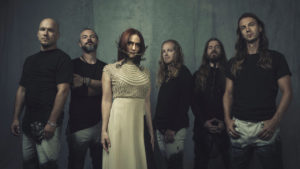 Being free of outside pressure?
Being free of outside pressure?
Yeah, we want to make our artistic choice ourselves, to have a full artistic freedom. That was something I said from the beginning, when we signed a contract with Nuclear Blast: «We want total freedom». There’s no record company telling us what to do. Because for us it’s very important that we are happy with all the choices we make. And they said: «Yeah, that’s exactly our philosophy! You do the music, you do the artistic side – we don’t interfere with that. And we do the promotion and advertisement, and you also don’t interfere too much with that». So then everybody’s happy. And that’s how it works.
And Mark, I’d love to hear a few tips for beginners about extreme vocals! Nowadays there are all kinds of rock schools, YouTube channels with lessons on this type of performing. How not to harm the vocal cords and where to start? What was your path? Screaming and growling into the pillow at first, like Tatyana Shmayluk from the Ukrainian band Jinjer? As she said in one of her interviews, it was in order not to frighten relatives and neighbors! Or something else?
Luckily, I live in a separate house, so there’s no neighbors nearby. So I can grunt and scream as loud as I want. I started just by trial and error, it was like 25 years ago, with not much known about it yet. There were no books written, no documentaries to watch. I just tried and see if it worked. And in the beginning it did hurt a bit, so I thought this is not the way and tried another way where it didn’t hurt. From every time that I tried, I did it better and better. In the beginning I focused just on the screams, and later on also added the grunts. So it was a matter of learning, a long, long process of learning. But to everybody who starts with it I always say: «Make sure that you’re not forcing your vocal cords». Because if you’re forcing and it hurts, you’re doing it wrong and can damage your vocal cords. So you have to make sure that it feels good and you breathe well like with normal vocal technique. Actually, with the breathing technique is the same as with normal vocal exercises. It’s just the sound that comes more from the throat.
 Or maybe it will be a great help to learn basic academic vocal as a base before start growling and screaming.
Or maybe it will be a great help to learn basic academic vocal as a base before start growling and screaming.
Yeah, if you know already the techniques of normal breathing exercise for vocalist, or the normal technique for singing, then there’s a smaller step to also learn the grunts. Because nowadays, there are many lessons you can follow from normal singing and adding grunts as well without harming your vocal cords.
And another topic to speak about… As we know, you have a master’s degree in psychology from one of the universities. And you are also interested in knowledge of ancient cultures and the latest discoveries from various fields of science. How does all of it affect creativity in your case?
Yeah, to start with my psychology studies, you learn a lot of things. So there are many theories out there, and I had to also learn things that I was not agreeing with. But then when I finished my studies, the things that I didn’t believe I just throw them away. And I always kept that philosophy. Also with all the later things I learned nowadays that whatever I believe intuitively and think it’s true – I keep it. And the things or the theories that I have nothing in common – I just let it go away.
Mark, please tell a little about Latin language and its place in the band’s work. What is the specificity of writing lyrics? And do you intentionally use in some places the stylization of Gregorian singing? Was the keyboard player of Epica Coen Janssen inspired, for example, by Bach’s chorales when composing some of the choral parts?
Yeah, the thing is that we all compose choirs, but he arranges them at the end. So we all also compose choirs for our own songs. But he always adds some nice elements. So if you compare the choirs that we’ve written ourselves to the end result, you always hear them coming alive. He has some extra lines, some extra harmonies. So he always does some magic with them. And he also indeed added some Gregorian style choirs. And the reason we use Latin in our songs is that when the choir sings in Latin, it sounds even more majestic! It sounds more beautiful! More, more… Yeah, majestic is the right word! And so it’s not to have like secret messages in the lyrics that people cannot understand, it’s just for the sound that we really like, the sound when choir sings…
Inspiring!
Yes, yes, yes!
 And maybe because Latin is a dead language? And perhaps for this reason, Latin, in comparison with other languages, is a language that is cleared of the burden of additional semantic add-ons?
And maybe because Latin is a dead language? And perhaps for this reason, Latin, in comparison with other languages, is a language that is cleared of the burden of additional semantic add-ons?
Yeah, at least it stays the same and there’s no new development. But the main reason is literally the sound of the choir. When they sing in Latin, it’s very powerful. And there’s something you cannot achieve with many other languages, you cannot achieve that same sensation. When they sing in Latin, it’s so powerful!
And Mark, does the filmscore music as well as the classical influence the band’s creativity?
Yeah, there are a lot of classical composers that found their way into the Epica style. Personally, I listened a lot to Rachmaninov for many years, because I really like his complex structures and dark emotions. It’s very, very complex stuff. If you analyze Rachmaninov music, there’s so much layers and so much going on. It’s very interesting.
Maybe also Gustav Mahler and its large orchestra?..
Yes, yes! And Gustav Mahler is really the big, big stuff! Yes! Even a guy like Mozart – for example, the Requiem it’s a very beautiful piece! It’s one of the most beautiful pieces, in my opinion, in classical music ever written! It touches me, right?
And for this reason, it’s very, very popular!
Yes! Because I think everybody can feel something personal with that piece. It’s touching everybody in the heart right away. And Beethoven’s music is, of course, also beautiful! But there are so many composers!.. Tchaikovsky… Many great composers that find their way into our music.
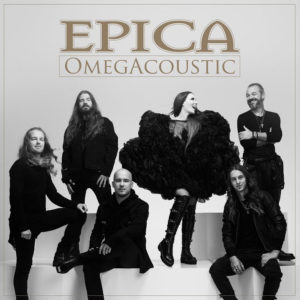 It’s great! And one more question! Quite often in «Epica» tracks there is such a technique as choral vocalization, which is sung to one or another vowel. Do you consider vocalization a unique tool in the band’s creative arsenal? And do you think of it as an integral link built into the overall dramaturgy of your music?
It’s great! And one more question! Quite often in «Epica» tracks there is such a technique as choral vocalization, which is sung to one or another vowel. Do you consider vocalization a unique tool in the band’s creative arsenal? And do you think of it as an integral link built into the overall dramaturgy of your music?
So what is exactly the question? And «vowel» – what do you mean?
Quite often during the tracks we can hear the vocalization on some vowels, as the easiest and unique tool for building the form of composition – in this case.
First of all, when we start to write music, we’re writing vocal lines, and then we made sure that they fit together. So if there’s, for example, a very strong vocal line – stronger than the music, we change music to fit the vocal line. Usually the music remains the same, and we make a vocal line fit the music. But it’s a continuous process, and only when the song is completely finished, then we write all the words. So that’s the second step, when we have the vocal line with nonsense lyrics, and need to replace the nonsense lyrics with real lyrics that have the same function. Usually, the nonsense lyrics sound very good. And then you have to find new words that sound as good as the nonsense lyrics. Because it’s a huge piece of work, we’re always have to make sure that the message of the words are not more important than how they’re going to sound on the album. So sometimes we have to make a sacrifice with the meaning of a lyric because it’s just sounds better with another word that makes it less obvious than what I want to say, but sounded much better. It’s always a matter of balance.
Is there a sufficient difference between live recordings with small vocal and choral ensembles on the first albums, and for example, the choir of the National Theatre in Miskolc, and the Amsterdam chamber choir «PA’dam» on the latest albums? The same question concerning the orchestras – the Remenyi Ede Chamber Orchestra on the live album «Retrospect» (2013) and the Prague Philharmonic Orchestra on the new studio album «Omega» (2021).
Yeah, the Prague orchestra and the Hungarian one – they’re both amazing orchestras! There are so many people involved, we can make all the stuff that we have written into reality! So there’s not much difference between them. But the choirs – when you compare the first album with the last, we were at the beginning with a very small choir and just singing same thing many times so a small choir can sound big. Nowadays we have a big choir and that don’t have to do it, it’s already big by itself. So it’s a different technique of recording. But when you have a big choir with many different vocalists, it always has a more big sound. Because when you have just like four people, a bass a tenor, soprano… and what did I miss?
Alto or mezzo-soprano.
Yeah, when they just record many times, it’s still the same voice. So you can never get it as big as when you have many people with slightly different voices. Yes, there is a difference!
Mark, thanks for the interesting conversation! As one of the Russian poets says, «There are minutes that are worth years and years that are not worth a minute». Just today, well, these 30 or maybe 40… 50 minutes, which, for me personally are equivalent to many happy years! I wish you good health, creative passion, motivation, inspiration and prosperity to all members of the band and all your loved ones! Say hello to Simone, Coen, Isaac, Rob and Arien from Moscow!
Sergey TERENTIEV
Thanks to Maxim Bylkin from Soyuz Music label for organizing this interivew.
Russian version is at http://inrock.ru/interviews/epica_interview_2021

